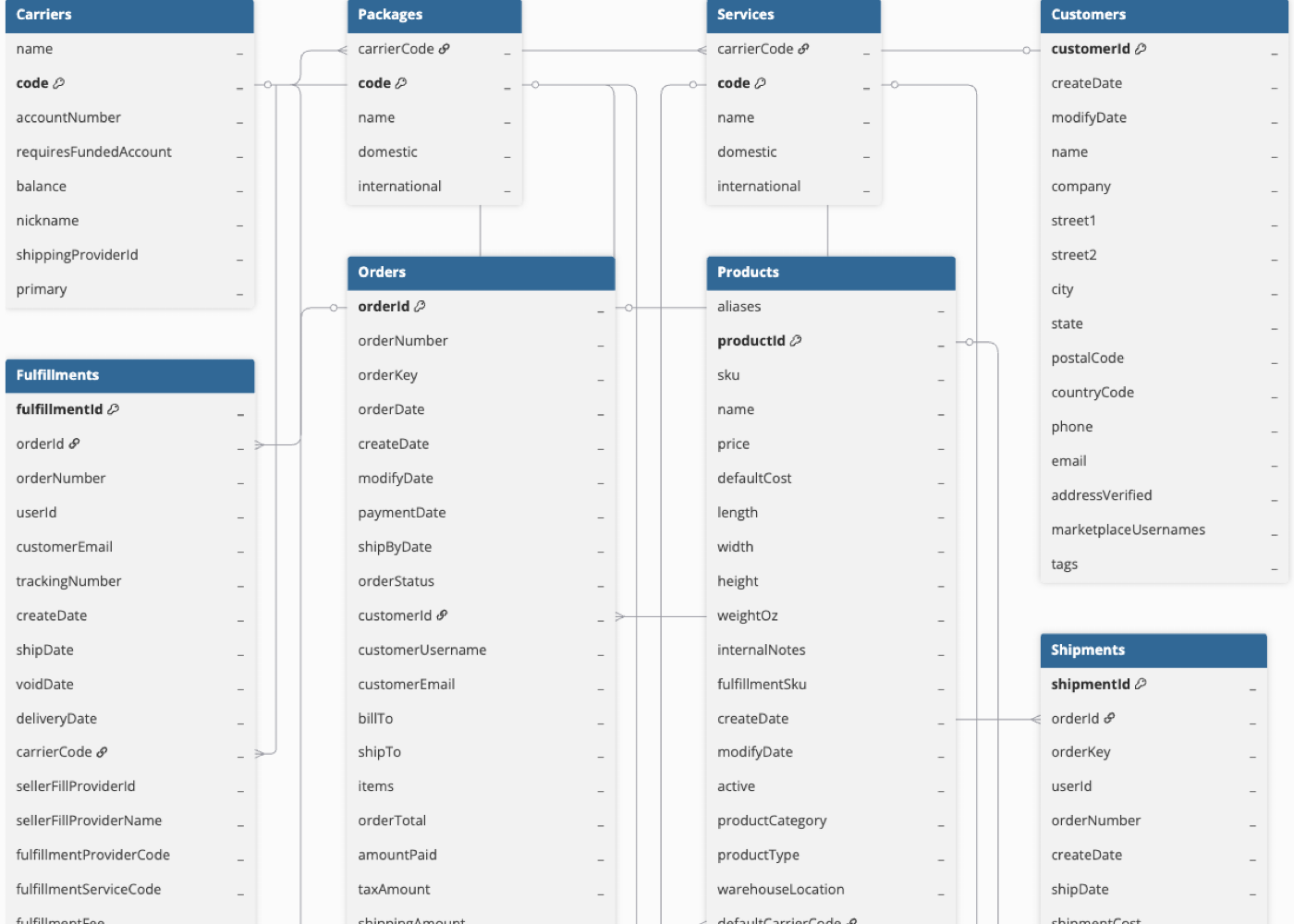ShipStation is a cloud-based shipment platform that streamlines the shipping process for online retailers. It provides order processing, inventory management, creation of shipping labels, and customer communication all into one easy-to-use interface. It can be integrated directly with sellers (online or offline). It also allows you to track the shipment status and manage returns for an order.
ShipStation authenticates API requests from Hevo to access your account data with HTTP Basic authentication where the username is your API key and password is your API secret.
Prerequisites
-
An active ShipStation account from which data is to be ingested exists.
-
The API key and secret are available to authenticate Hevo on your ShipStation account.
-
You are logged in as an Admin user or a user with admin privileges to obtain the API key and secret.
-
You are assigned the Team Administrator, Team Collaborator, or Pipeline Administrator role in Hevo to create the Pipeline.
Obtaining the API Key and Secret
You require an API key and a secret to authenticate Hevo on your ShipStation account.
Note: You must log in as an Admin user or a user with the Admin privileges to perform these steps.
To generate the API Key and secret:
-
Log in to your ShipStation account.
-
On the top right of the page, click the Account icon.
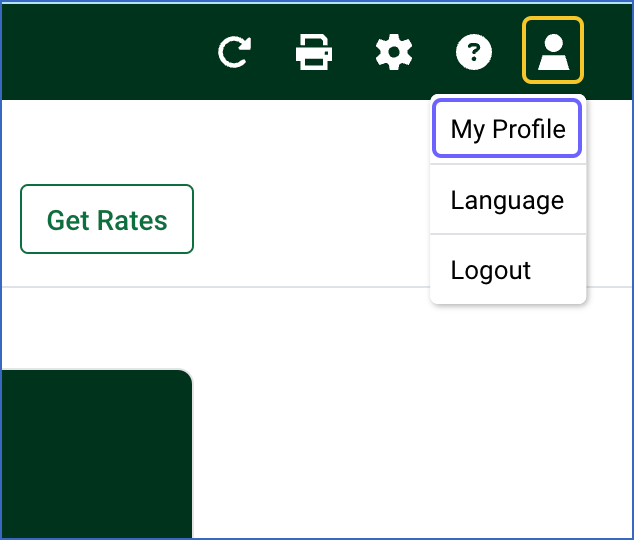
-
From the drop-down menu, click My Profile.
-
In the left navigation pane, under Account, click API Settings.
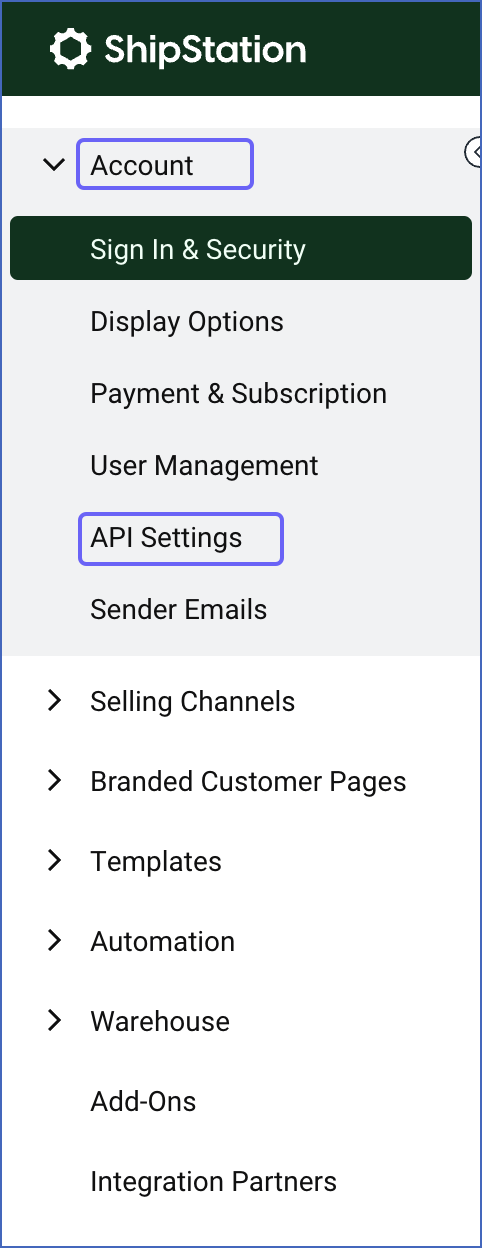
-
On the API Settings page, under API Keys section, select V1 API from the Select API Version drop-down, and then click Generate API Key.
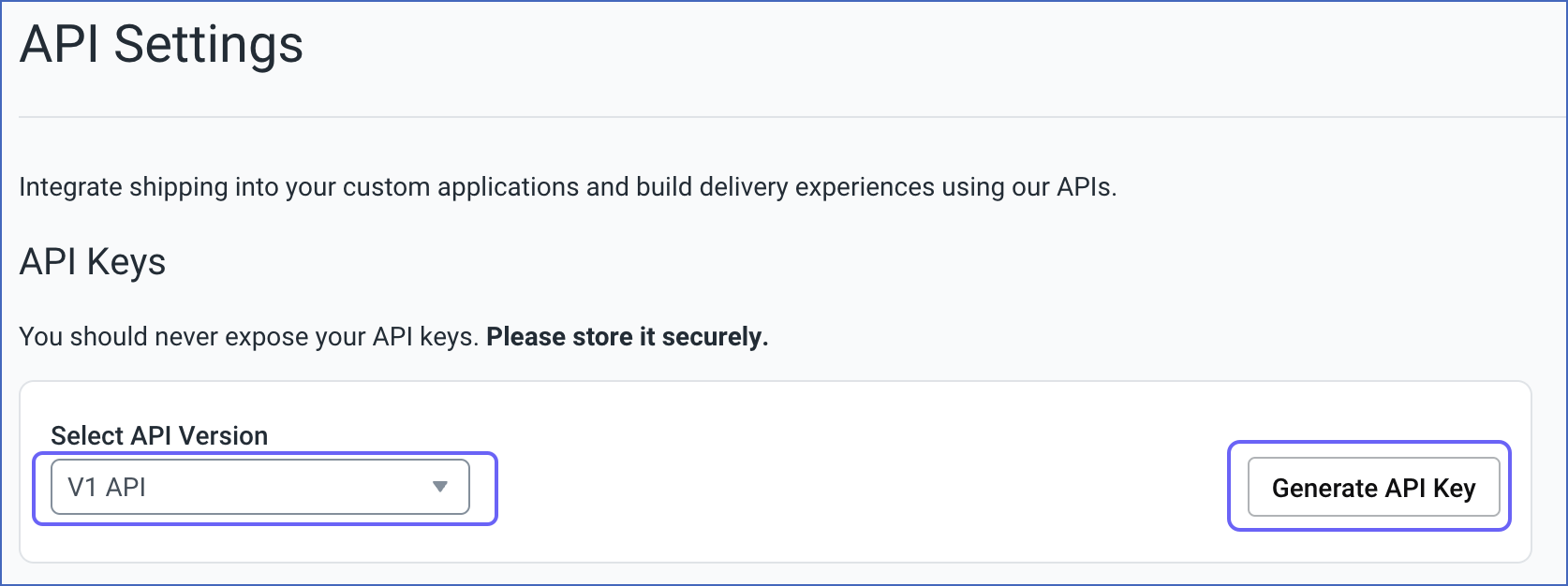
-
In the Generate API Key pop-up dialog, select the expiration period for the API key, and click Generate.
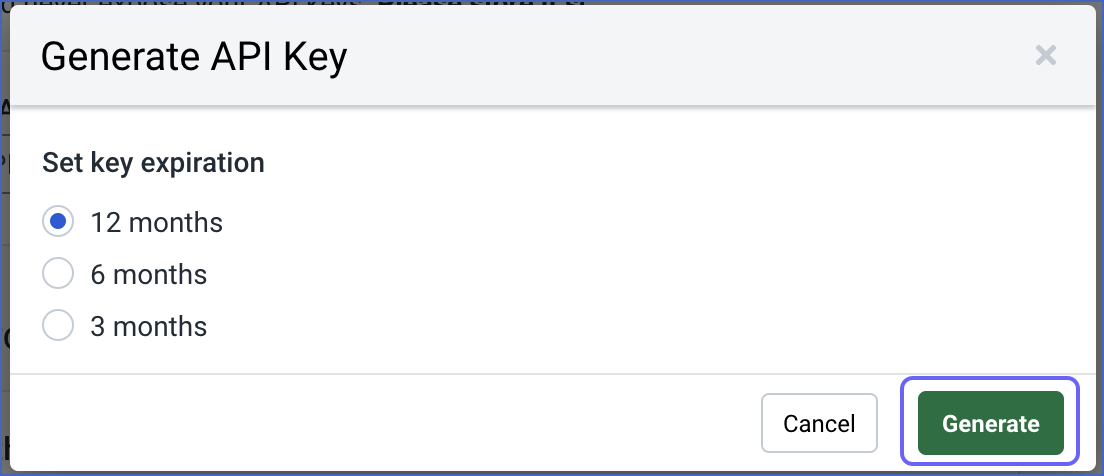
-
Copy the API Key and Secret Key and save them securely like any other password.
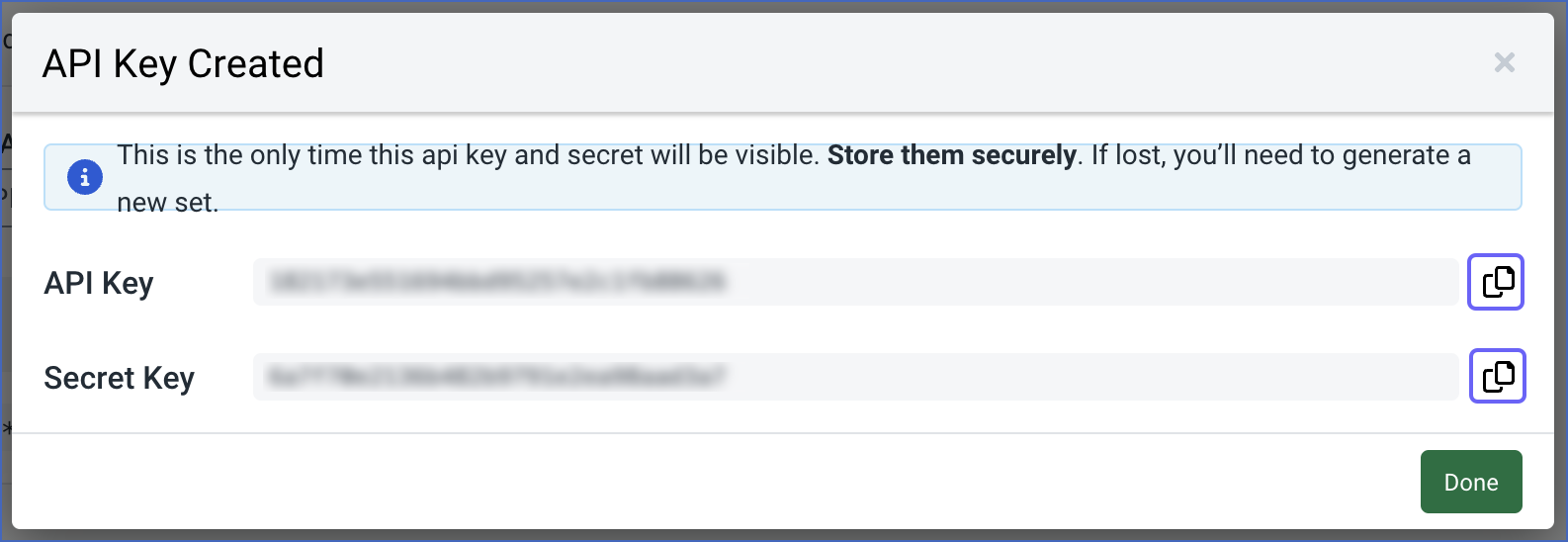
You can use these credentials while configuring your Hevo Pipeline.
Configuring ShipStation as a Source
Perform the following steps to configure ShipStation as the Source in your Pipeline:
-
Click PIPELINES in the Navigation Bar.
-
Click + Create Pipeline in the Pipelines List View.
-
On the Select Source Type page, select ShipStation.
-
On the Select Destination Type page, select the type of Destination you want to use.
-
On the Configure your ShipStation Source page, specify the following:
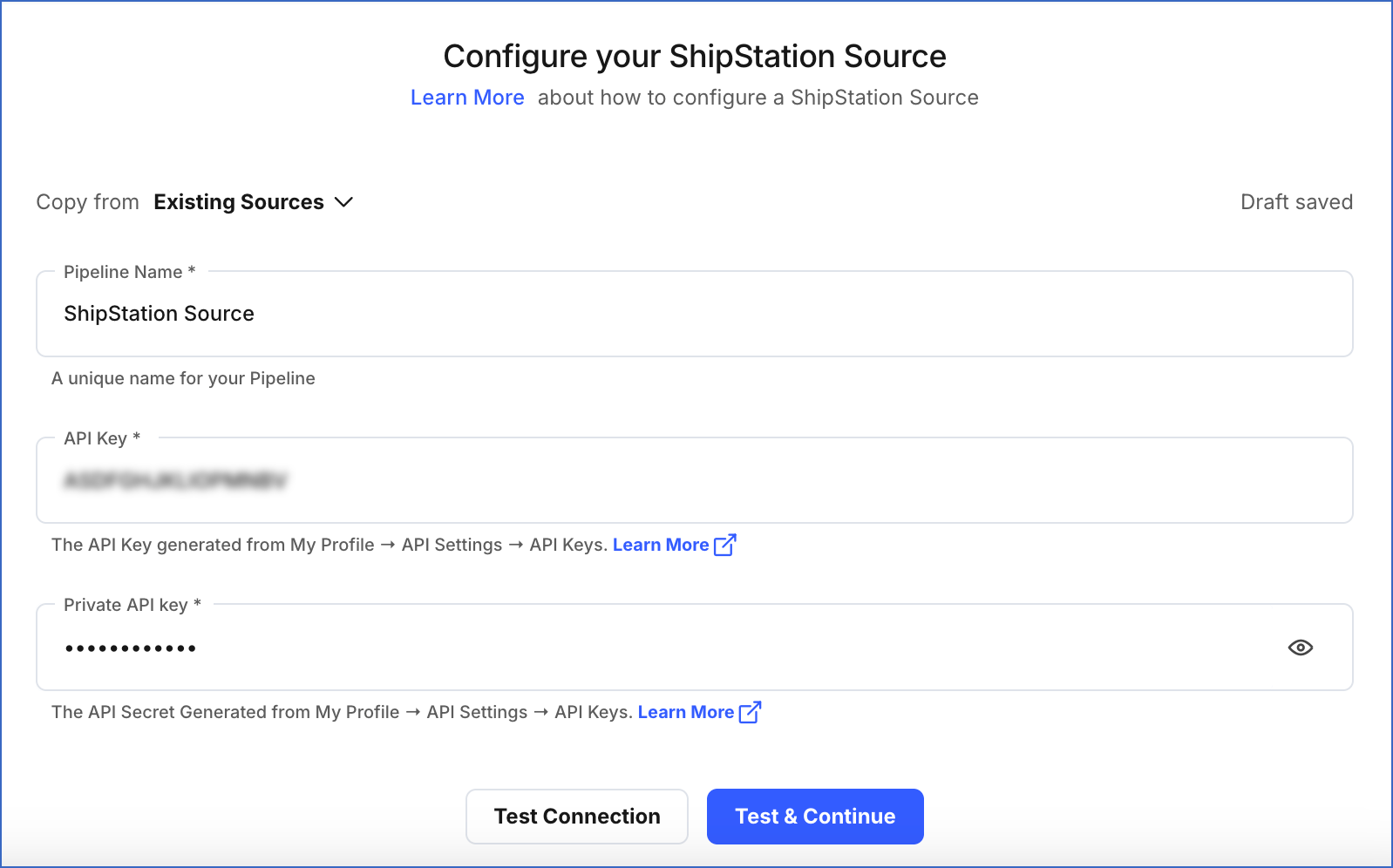
-
Pipeline Name: A unique name for the Pipeline, not exceeding 255 characters.
-
API Key: The API key that you generated in your ShipStation account.
-
API Secret: The API secret that you generated in your ShipStation account.
-
-
Click Test & Continue.
-
Proceed to configuring the data ingestion and setting up the Destination.
Data Replication
| For Teams Created | Default Ingestion Frequency | Minimum Ingestion Frequency | Maximum Ingestion Frequency | Custom Frequency Range (in Hrs) |
|---|---|---|---|---|
| Before Release 2.21 | 1 Hr | 1 Hr | 24 Hrs | 1-24 |
| After Release 2.21 | 6 Hrs | 30 Mins | 24 Hrs | 1-24 |
Note: The custom frequency must be set in hours as an integer value. For example, 1, 2, or 3, but not 1.5 or 1.75.
-
Historical Data: In the first run of the Pipeline, Hevo ingests all the existing data for the selected objects from your ShipStation account and loads it to the Destination.
-
Incremental Data: Once the historical load is complete, all new and updated records for the Fulfillments, Orders, and Shipments objects are ingested as per the ingestion frequency. The remaining objects are ingested in Full Load mode.
Schema and Primary Keys
Hevo uses the following schema to upload the records in the Destination database. For a detailed view of the objects, fields, and relationships, click the ERD.
Data Model
The following is the list of tables (objects) that are created at the Destination when you run the Pipeline:
| Object | Mode | Description |
| Carriers | Full Load | Contains the details of all the shipping provider companies connected to your ShipStation account. |
| Customers | Full Load | Contains the details of individuals or organizations who have placed an order. |
| Fulfillments | Incremental | Contains the details of orders that are shipped. |
| Marketplaces | Full Load | Contains the details of all the sellers that you can integrate with your ShipStation account. |
| Orders | Incremental | Contains the details of all orders placed by customers. |
| Packages | Full Load | Contains the list of orders available for shipment by a specific carrier. |
| Products | Full Load | Contains the details of items available for sale in the stores that are integrated with your ShipStation account. |
| Services | Full Load | Contains the list of shipping methods available for a carrier. |
| Shipments | Incremental | Contains the details of all orders for which shipping labels have been generated in your ShipStation account. |
| Stores | Full Load | Contains the details of all sellers integrated with your ShipStation account. |
| Users | Full Load | Contains the list of users that can access your ShipStation account. |
| Warehouses | Full Load | Contains the details of the locations where the order is shipped from or returned to. |
Source Considerations
-
Pagination: An API response for each ShipStation object fetches one page with up to 500 records.
-
Rate Limit: ShipStation imposes a limit of 40 API calls per minute per API key and secret. If the limit is exceeded, Hevo defers the ingestion till the limits reset. Read API Rate Limits to know more about rate limits in ShipStation, and configure a suitable ingestion frequency for your Pipeline.
-
ShipStation supports the Pacific Standard Time (PST), and not UTC, due to which Hevo displays the position of the incremental objects in PST.
Limitations
-
Hevo currently does not support deletes. Therefore, any data deleted in the Source may continue to exist in the Destination.
-
Hevo does not provide you with the option to select the historical sync duration for loading historical data. All the historical data in your ShipStation account is loaded.
-
Hevo does not load data from a column into the Destination table if its size exceeds 16 MB, and skips the Event if it exceeds 40 MB. If the Event contains a column larger than 16 MB, Hevo attempts to load the Event after dropping that column’s data. However, if the Event size still exceeds 40 MB, then the Event is also dropped. As a result, you may see discrepancies between your Source and Destination data. To avoid such a scenario, ensure that each Event contains less than 40 MB of data.
Revision History
Refer to the following table for the list of key updates made to this page:
| Date | Release | Description of Change |
|---|---|---|
| Nov-11-2025 | NA | Updated the document as per the latest Hevo UI. |
| Sep-18-2025 | NA | Updated section, Configuring ShipStation as a Source as per the latest UI. |
| Sep-17-2025 | NA | Updated section, Obtainting the API Key and Secret as per the latest ShipStation UI. |
| Jul-07-2025 | NA | Updated the Limitations section to inform about the max record and column size in an Event. |
| Jan-07-2025 | NA | Updated the Limitations section to add information on Event size. |
| Mar-05-2024 | 2.21 | Updated the ingestion frequency table in the Data Replication section. |
| Oct-25-2022 | 2.00 | New document. |
